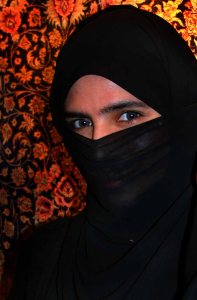 What is a niqab? A niqab is a scarf used to cover a woman’s face except her eyes. Her breasts, hair, ears are covered with a separate scarf. This is different from the hijab which leaves the entire face exposed and burka which covers the entire body and leaves a mesh screen over the eyes to see through.
What is a niqab? A niqab is a scarf used to cover a woman’s face except her eyes. Her breasts, hair, ears are covered with a separate scarf. This is different from the hijab which leaves the entire face exposed and burka which covers the entire body and leaves a mesh screen over the eyes to see through.
Ms. Ishaq, of Mississauga, Ontario continues her fight against the government to wear a niqab while swearing an oath of citizenship to become a Canadian. The Stephen Harper government banned this practice but Ms. Ishaq filed an appeal. In the appeal, the Federal court decided to lift the ban on the niqab as it violated government regulations.
Federal Judge Keith Boswell stated that it “interferes with a citizenship judge’s duty to allow candidates for citizenship the greatest possible freedom in the religious solemnization or the solemn affirmation of the oath.”
His decision has resulted in significant debate among some devout Muslims.
Controversy
Devout Muslim and activist Raheel Raza, who currently serves on The Council for Muslims Facing Tomorrow, author of Their Jihad … Not my Jihad and an international activist for women’s rights, argues that the niqab has no connection to Islam. She went as far to state:
“ They’re the political flags of the Muslim Brotherhood, ISIS, the Taliban, al-Qaida and Saudi Arabia.” (http://tinyurl.com/pplxxll)
Ms. Raza goes on to inform Canadian judges that niqabs are not permitted in Pakistani courts. She supports this with the fact that in 2004, Chief Justice of the Peshawar High Court (PHC), Tariq Pervaiz Khan, had forbidden female attorneys from wearing face veils in courtrooms due to the fact that they couldn’t be identified, nor assist the court properly while wearing veils. He then went further to inform the women wearing niqabs that they are professionals and covering their faces is not a religious requirement.
Supporting these views is a scholar of Islamic history; Prof. Mohammad Qadeer of Queen’s University, Kingston, Ontario who informed the Globe and Mail:
“The argument about concealing one’s face as a religious obligation is contentious and is not backed by the evidence. In Western societies, the niqab also is a symbol of distrust for fellow citizens and a statement of self-segregation. The wearer of a face veil is conveying: ‘I am violated if you look at me.”(http://tinyurl.com/pplxxll)
 The foundation for the Federal court decision was banning the niqab didn’t “allow candidates for citizenship the greatest possible freedom in the religious solemnization or the solemn affirmation of the oath.” However, these devout Muslims and activists are arguing no rights would be violated as it is not a religious practice.
The foundation for the Federal court decision was banning the niqab didn’t “allow candidates for citizenship the greatest possible freedom in the religious solemnization or the solemn affirmation of the oath.” However, these devout Muslims and activists are arguing no rights would be violated as it is not a religious practice.
Conversely, Muslims who identify with Ms. Ishaq clearly disagree as they interpret the religion scriptures to state otherwise.
The opposing counsel is determined to take the matter to the Supreme Court of Canada in hopes to overturn the appeal.
This decision will be a defining case that will help shape future legislation and Canadian history.
Did you like this piece? Did it get you thinking? If so, please press like and subscribe!
Points of Discussion:
1. What are your thoughts? What points do you agree/disagree with?